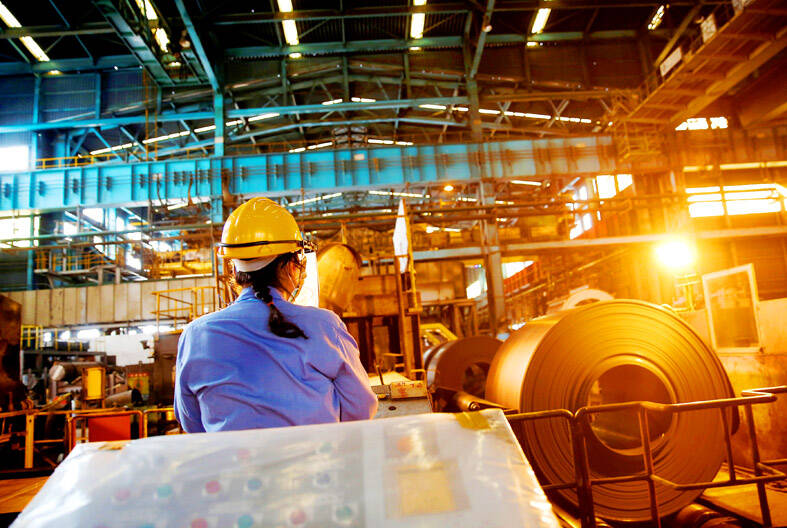China Steel Corp (中鋼), the largest steelmaker in Taiwan, yesterday reported pre-tax profit of NT$947.92 million (US$30.93 million) for last month, surging from a pre-tax profit of NT$69.3 million in February, as a result of a higher number of shipments and a rise in average selling prices.
Shipments of carbon steel expanded 3.62 percent to 691,344 tonnes last month from 667,207 tonnes the previous month, the company said in a statement.
China Steel also raised domestic steel prices by NT$1,200 per tonne for last month’s deliveries, matching its global peers to reflect rising raw material costs.

Photo: Tyrone Siu, Reuters
During the first three months of this year, the company posted pre-tax losses of NT$74.97 million, compared with losses of NT$7.19 billion in the fourth quarter of last year.
China Steel reported pre-tax profit of NT$14.5 billion in the first quarter of last year, company data showed.
Demand in the domestic market remains muted in the short term due to inventory digestion by downstream companies, the company said.
The firm expects demand to rebound in the second half of the year, aided by government tax incentives intended to boost purchases of new vehicles and energy-efficient home appliances.
Recovering steel consumption for new housing projects should also help demand, it said.
Given the dynamics of supply and demand in the global steel market, a persistent decline in international crude steel production would help bolster steel prices, China Steel said.
Global crude steel production dropped 1 percent annually to 142.4 million tonnes in February, marking the fourth straight month of decline, it added.
Steel supplies are expected to drop further as the world’s major steel-producing countries curb manufacturing to reach carbon reduction goals, it said.
Meanwhile, the World Steel Association has forecast global steel demand to increase 2.3 percent this year, compared with just 1 percent growth estimated in October last year.

Semiconductor business between Taiwan and the US is a “win-win” model for both sides given the high level of complementarity, the government said yesterday responding to tariff threats from US President Donald Trump. Home to the world’s largest contract chipmaker, Taiwan Semiconductor Manufacturing Co (TSMC, 台積電), Taiwan is a key link in the global technology supply chain for companies such as Apple Inc and Nvidia Corp. Trump said on Monday he plans to impose tariffs on imported chips, pharmaceuticals and steel in an effort to get the producers to make them in the US. “Taiwan and the US semiconductor and other technology industries

A start-up in Mexico is trying to help get a handle on one coastal city’s plastic waste problem by converting it into gasoline, diesel and other fuels. With less than 10 percent of the world’s plastics being recycled, Petgas’ idea is that rather than letting discarded plastic become waste, it can become productive again as fuel. Petgas developed a machine in the port city of Boca del Rio that uses pyrolysis, a thermodynamic process that heats plastics in the absence of oxygen, breaking it down to produce gasoline, diesel, kerosene, paraffin and coke. Petgas chief technology officer Carlos Parraguirre Diaz said that in

SMALL AND EFFICIENT: The Chinese AI app’s initial success has spurred worries in the US that its tech giants’ massive AI spending needs re-evaluation, a market strategist said Chinese artificial intelligence (AI) start-up DeepSeek’s (深度求索) eponymous AI assistant rocketed to the top of Apple Inc’s iPhone download charts, stirring doubts in Silicon Valley about the strength of the US’ technological dominance. The app’s underlying AI model is widely seen as competitive with OpenAI and Meta Platforms Inc’s latest. Its claim that it cost much less to train and develop triggered share moves across Asia’s supply chain. Chinese tech firms linked to DeepSeek, such as Iflytek Co (科大訊飛), surged yesterday, while chipmaking tool makers like Advantest Corp slumped on the potential threat to demand for Nvidia Corp’s AI accelerators. US stock

SUBSIDIES: The nominee for commerce secretary indicated the Trump administration wants to put its stamp on the plan, but not unravel it entirely US President Donald Trump’s pick to lead the agency in charge of a US$52 billion semiconductor subsidy program declined to give it unqualified support, raising questions about the disbursement of funds to companies like Intel Corp and Taiwan Semiconductor Manufacturing Co (台積電). “I can’t say that I can honor something I haven’t read,” Howard Lutnick, Trump’s nominee for commerce secretary, said of the binding CHIPS and Science Act awards in a confirmation hearing on Wednesday. “To the extent monies have been disbursed, I would commit to rigorously enforcing documents that have been signed by those companies to make sure we get